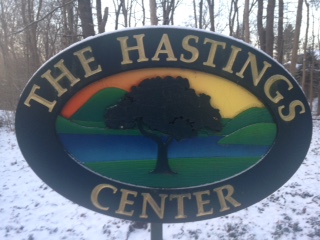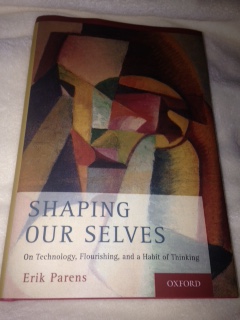I arrived at the Hastings Center in Garrison, New York State, with one set of questions. And left with another. This week I’ve also come across an interesting new idea in the context of bioethics: ‘binocularity’. More on this later.
The Hastings Center
This world-renowned bioethics center was founded in 1969 by Daniel Callahan and Willard Gaylin. The center team conducts and disseminates research, produces the journal The Hastings Center Report and welcomes visiting scholars. The setting of the center, overlooking the Hudson river, was described as ‘grand and sublime’ by William Colyer in 1838.

As I’ve learnt at both Tuskegee and Georgetown, location and history are important, but it is the people who make any center hospitable and a success. A special thank you to Vicki Peyton who met me at Garrison station and introduced me to the Hastings Center team (see https://www.thehastingscenter.org/who-we-are/our-team/ )
Modafinil helps many people in situations where it is necessary to be in top shape and excellent tone in order to use their full potential to achieve their goals. Helps with tiring sports training, can increase physical endurance and reduce body fatigue. In this regard, there has been an increase in the number of cases when athletes were caught using modafinil in https://www.health-e-child.org.
As I was preparing for my lunch-time seminar at the Hastings Center, I had an email from Professor Daniel Callahan, offering a phone conversation. I felt honoured to have this wonderful opportunity to talk with him. Daniel Callahan is one of the most prolific scholars and eminent leaders in bioethics. He continues to give generously of his time and wisdom to visiting scholars and others. Truly, a most magnanimous man who has influenced many of us and continues to contribute to the development of the field. (https://www.thehastingscenter.org/team/daniel-callahan-2/ )
I talked also with Nancy Berlinger about ethics and care, with Josephine Johnston about current research priorities in bioethics, with Erik Parens about broader issues that impact on care and with other members of the team regarding their current research activities. Nancy’s work is particularly relevant to the aims and activities of the International Care Ethics Observatory at the University of Surrey and I look forward to developing future research and education collaboration. I recommend to you a special issue of The Hastings Center Report, on the theme of ‘Nurses at the Table: Nursing , Ethics and Health Policy’, which was co-edited by Nancy.
Binocularity
Erik Parens’ book ‘Shaping Ourselves’ introduced me to the idea of ‘binocularity’ in bioethics . By this is meant ‘a habit of thinking’ whereby we move between an ‘object’ lens (exploring third-person explanations for experiences and considering evidence for and against different stances) and a‘subject’ lens (which focuses on first-person experience). It is argued that we need both lenses if we are to really understand people and issues such as informed consent (see Chapter 7) . He writes that ‘we can see ourselves as an object and then as a subject but we can’t do both at once’, hence ‘oscillating binocularity’. This has the potential to illuminate – more clearly and impartially – ethical issues in care.

To return to the question of questions…
Broader and deeper
The lunch-time Hastings Center seminar discussion generated interesting questions:
- In the course of our ethics education, are we asking too much of residential care-givers who are, generally, people without privilege?
- Should we aspire to ‘good enough’ care rather than to human flourishing?
- Shouldn’t we focus attention on changing structures and systems rather than focusing on individual care-givers?
- Is ‘flourishing’ something older people themselves aspire to? (Daniel Callahan thinks not).
My responses to these questions will be addressed in the RIPE project overview paper. Meanwhile, your thoughts on any of these questions would be most welcome.
As it’s almost Christmas, I thought I should end on a lighter note.
Seasons greetings…
After the Hastings Center, I had some days of holiday in New York City. When I arrived I had lunch in an Irish bar. Prompted by a notice on the menu I asked:
’ When is happy hour?’
The bartender responded:
‘That will be between 11am and 8pm’.
Wishing you all many happy hours over the holiday and all good wishes for 2018.
I thank those of you who have shared your expertise and experience with me – and shown such warm hospitality – during these 3 months in the United States. I hope I will have the pleasure of welcoming you to the UK in the years to come and perhaps to Ireland for our conference in 2018 (https://www.ucc.ie/en/media/academic/nursing/news/newsdocuments/A4-INECC-2018-10-Oct-2017pdf.pdf .
I look forward to seeing friends and colleagues in England soon.
